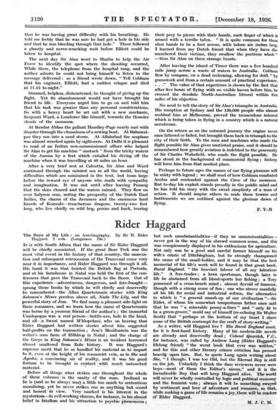Rider Haggard
IT is with South Africa that the name of Sir Rider Haggard will be chiefly associated. If the great Boer Trek was the most vital event in the history of that country, the annexa- tion and subsequent retrocession of the Transvaal come very near it in importance, and Rider Haggard was through it all. His hand it was that hoisted the British flag at Pretoria, and at his farmhouse in Natal was held the first of the con- ferences that gave the Transvaal back to the Boers. Out of this experience—adventurous, dangerous, and fate-fraught- sprang those books by which he will chiefly and deservedly be remembered—the Allan Quartermain stories with King Solomon's Mines peerless above all, Nada The Lily, and the powerful story of Jess. We find many a pleasant side-light on these romances, and we learn how the name of Quartermain was borne by a yeoman friend of the author's ; the immortal Umslopogas was a real person—battle-axe, hole in the head, and all—a Swazi named M'hlopekazi, who on hearing that Rider Haggard had written stories about him suggested half-profits on the transaction ; Jess's Mociifontein was the writer's own farm of Ililldrop in Natal ; and the charge of the Greys in King Solomon's Mines is an incident borrowed almost unaltered from Zulu history. It was Haggard's supreme merit that he so handled his material as to impart to it, even at the height of his romaneist vein, as in She and Ayesha, a convincing air of reality, and it was his good fortune to be brought in contact with much untouched material.
Before all things what strikes one throughout the whole of these volumes is the sanity of the man. Inclined as he is (and as he always was) a little too much to sententious moralizing, yet he never strilres one as anything but sound and honest' in view. Very marked is his interest in the mysterious—in evil-working charms, for instance, in his almost belief in fatalism and his attraction to psychic phenomena ;
but such unsubstantialities—if they be imsubstantialities- never got in the way of his shrewd common sense, and this was conspicuously displayed in his enthusiasm for agriculture. Not only was he a good and careful farmer himself on his wife's estate of Ditchingham, but he strongly championed the cause of the small-holder, and it may be that the best memorial of his life's work will be found in that great book, Rural England, " the heaviest labour of all my laborious life." A free-trader ; a keen sportsman, though later in life he abstained from all blood-sports bar fishing ; a Tory possessed of a cross-bench mind ; almost devoid of humour, though with a strong sense of fun ; one who strove manfully all his life for social and industrial reform, the alternative to which is " a general smash-up of our civilization "—Sir Rider, of whom his somewhat tempestuous father once said that he was " a. miserable penny-a-liner " and " only fit to be a green-grocer," could say of himself (re-echoing Sir Walter Scott) that " perhaps at the bottom of my heart I share some of the British contempt for the craft of story-writing."
As a writer, will Haggard live ? His Rural England must, for it is first-hand history. Many of his modem-life novels are already and deservedly dead ; Colonel Quarileh, V.C., for instance, was called by Andrew Lang (Rider Haggard's lifelong friend) " the worst book that ever was written," and for this and other literary crimes criticism has pressed heavily upon him. But, to quote Lang again writing about She, " I though I was too Old, but the Eternal Boy is still on the job. Unluckily I think the dam reviewers never were boys—most of them the Editor's nieces," and it is the ineradicable Boy that will keep Haggard alive. The world will never be wholly controlled by logic and political economy and the feminist vote ; always it will be something swayed by sentiment and love of adventure and romance, so that, while making a game of life remains a joy, there will be readers of Rider Haggard.
M. J. C. M.










































 Previous page
Previous page